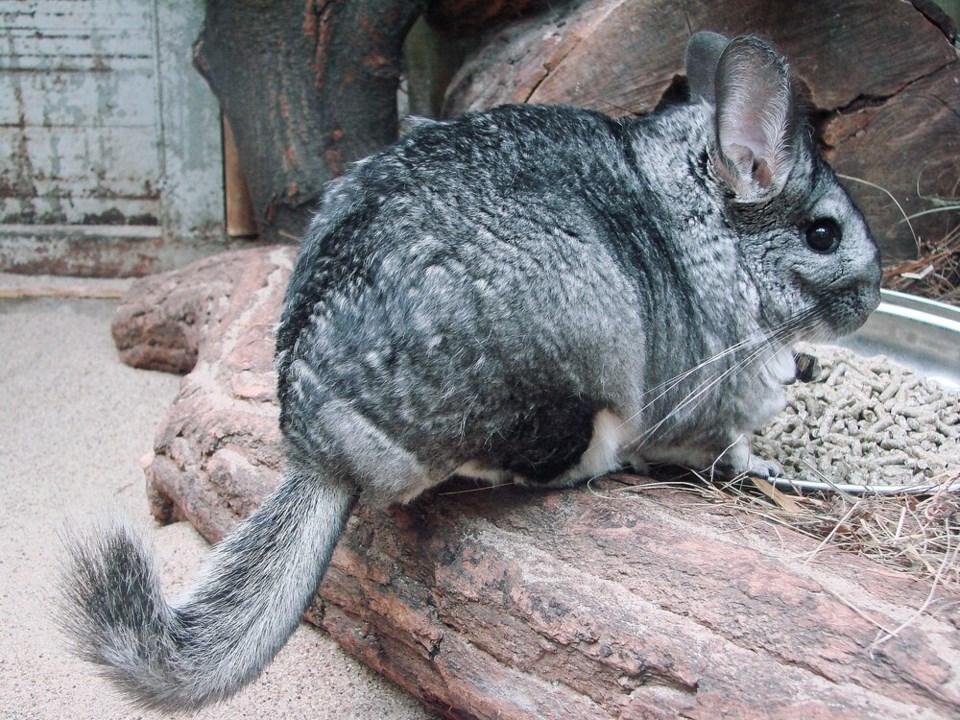The Association for The Protection of Fur-Bearing Animals is disappointed in a B.C. Supreme Court decision where the group had sought to have a chinchilla farming licence put aside.
B.C.’s chief veterinarian granted the licence to E and S Chinchilla Enterprises, a farm operated by Earl Giles in Buffalo Creek, in April 2020.
However, the animal advocacy group sued the province claimed the chief veterinarian issued a fur farm licence to B.C.’s only chinchilla farm even though it had operated for several years without a health management plan.
Chinchillas, roughly the size of a large squirrel and native to the Andes Mountains, are often kept as pets. Their soft fur has vaulted them into the global fur trade since the Spanish invaded the Incan Empire about 500 years ago.
Central to the case was the health-plan concern.
However, said an Aug. 8 decision from Justice Sheila Tucker, B.C.’s Fur Farm Regulation does not state that a licensed fur farmer must at all time have an established plan. Rather, she said, the regulation provides that one must be established.
Tucker said the regulatory regime does not support the association’s argument that granting a licence in the absence of an established health plan is unreasonable.
“The chief veterinarian’s decision to issue the licence was reasonable,” Tucker said.
On March 28, 2021, E&S applied for a renewal licence using the ministry’s renewal form. The renewal application disclosed E&S had relocated to a new address, Tucker said.
Two days later a ministry compliance officer told Giles that as a consequence of the relocation an inspection was required. It was carried out on May 20, 2021. It found there was no health-management plan in place.
The chief veterinarian said in Aug. 10, 2021 that a plan was near finalization. That was completed with a new licence having a March 31, 2022 expiry date.
Disappointment expressed
“The Fur-Bearers is disappointed with the decision,” the association said. “Madam Justice Tucker had sided with The Fur-Bearers on issues related to standing, and rejected the government’s arguments that the issue was moot and not of public importance. Furthermore, the case has revealed disturbing information about the ‘euthanasia’ practices used to kill these chinchillas.”
Further, the association said a key driver behind the case was to determine how these animals were being treated and killed.
“As the Ministry of Agriculture revealed through the (freedom of information) process ... they have not developed any standards for the care, handling, and euthanasia of chinchillas,” the group said in a blog statement. “It was learned through the case that the method of euthanasia employed on this fur farm was via anal electrocution.”
Association lawyer Victoria Shroff earlier likened B.C.’s only chinchilla farm to B.C.’s 10 mink farms, most of which are in the Fraser Valley. COVID-19 was discovered on at least three farms since the start of the pandemic, leading to the destruction of thousands of animals.
She told Glacier Media that anytime animal law matters get before B.C. Supreme Court it's a big deal. That's because the implications such decisions can have for animals and the law can be far-reaching, she said.
In Denmark, COVID-19 cases in mink led to a government order to cull the country’s entire farmed population. Since then, there has been a wider push in several countries, including the United States, to ban mink farming.
According to the International Fur Federation, the global fur trade is worth over $38 billion.
Chinchillas have not been found to carry the virus that causes COVID-19, but in Ontario, the government warns, “It is essential that an effective vector control be implemented, as mice and rats can carry communicable diseases to chinchillas.”
In B.C., a farm health management plan requires a blueprint on how the farm intends to track mortality rates and a description of the procedures used when isolating and segregating any fur-bearing animal on the fur farm showing signs of illness, among other measures.
With files from Stefan Labbé


